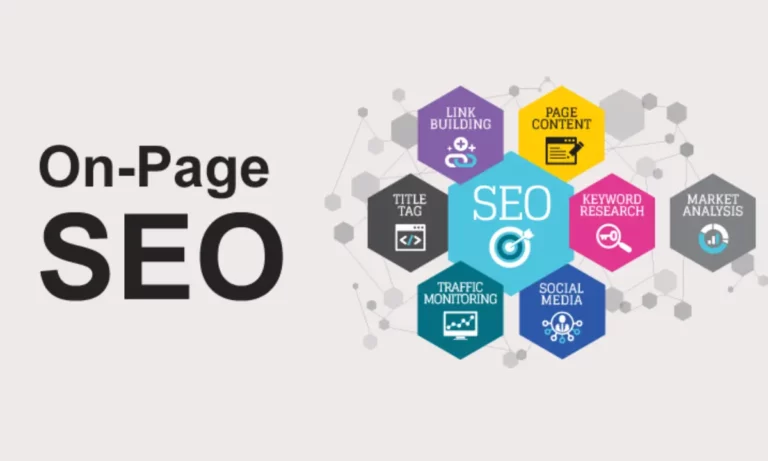As businesses rely increasingly on their online presence, search engine optimization (SEO) has become an essential tool. Among the various aspects of SEO, “On-Page SEO” stands out as a fundamental strategy. In this comprehensive guide, I will delve into the world of On-Page SEO, exploring its importance, key techniques, and practical tips to enhance your website’s visibility.
Analyzing On-Page SEO Performance
1. Understanding On-Page SEO
On-Page SEO refers to the optimization techniques that you implement directly on your website’s pages to improve its search engine rankings. These strategies focus on optimizing individual elements of your web pages to make them more search-engine-friendly.
2. Importance of On-Page SEO
Effective On-Page SEO is the foundation of a successful online presence. It helps search engines understand your content, leading to higher rankings and better visibility in search results. Your website will then receive organic traffic as a result.
3. Keyword Research and Optimization
One of the core principles of On-Page SEO is keyword optimization. By conducting thorough keyword research, you can identify the terms and phrases your target audience is searching for. Integrating these keywords strategically into your content can significantly boost your rankings.

4. Content Quality and Relevance
High-quality, relevant content is king in the world of SEO. Your content should provide value to your audience, answer their questions, and engage them. Google rewards such content with higher rankings.
5. Title Tags and Meta Descriptions
Crafting compelling title tags and meta descriptions not only informs users about your content but also entices them to click on your link in search results. These elements should be concise, descriptive, and include relevant keywords.
6. Header Tags
You can structure your content and make it more readable by using header tags. Properly using H1, H2, H3, and H4 tags not only enhances user experience but also helps search engines understand the hierarchy of information on your page.
7. URL Structure
A clean and descriptive URL structure not only aids in SEO but also makes it easier for users to navigate your website. It should be concise and contain relevant keywords.

8. Image Optimization
Optimizing images involves reducing file sizes, adding descriptive alt text, and ensuring they complement your content. This enhances both user experience and SEO.
9. Internal Linking
Linking to relevant internal pages on your website helps spread link equity and improves navigation. Additionally, it keeps users engaged with your content.
10. User Experience and Page Speed
A fast-loading website with a user-friendly design is essential for retaining visitors. Google considers page speed and user experience as ranking factors.
Mobile Optimization

Mobile Optimization
With mobile device usage on the rise, ensuring your website is mobile-friendly is imperative. Google prioritizes mobile-responsive sites in its rankings.
Schema Markup
You can improve search engine understanding of your content by implementing schema markup. It can lead to rich snippets in search results, increasing click-through rates.
Social Sharing Integration
Encouraging social sharing of your content can boost its visibility. Social signals are considered by search engines in ranking decisions.
Regular Content Updates
Frequently updating your content keeps it fresh and relevant. It also signals to search engines that your website is active and trustworthy.
Analyzing On-Page SEO Performance
Regularly monitor your On-Page SEO efforts using tools like Google Analytics and Search Console. Analyze data to identify areas for improvement.
Importance of on-page SEO
Better Search Engine Rankings:
Your web pages’ on-page SEO helps search engines understand their content and purpose. When search engines like Google can easily interpret your content, they are more likely to rank your pages higher in search results. Higher rankings mean more visibility and increased chances of attracting organic traffic.
Improved User Experience:
Many on-page SEO practices, such as optimizing page load times, using mobile-friendly designs, and creating well-structured content, also enhance the overall user experience. A better user experience leads to lower bounce rates and longer time spent on your website, which can indirectly contribute to higher search rankings.
Relevance and Targeting:
On-page SEO allows you to target specific keywords and phrases relevant to your content and audience. You can increase your chances of appearing in search results by strategically incorporating these keywords into your content, meta tags, and headings.
Increased Click-Through Rates (CTR):
Effective on-page SEO involves crafting compelling and informative title tags and meta descriptions. When these elements are optimized, they can entice users to click on your search result over others, leading to higher CTRs and more organic traffic.
Content Quality:
On-page SEO encourages you to create high-quality, informative, and relevant content. This not only pleases search engines but also provides value to your audience. Valuable content can attract more backlinks and social shares, further boosting your site’s SEO performance.
Competitive Advantage:
In a competitive online landscape, every advantage counts. Proper on-page SEO can give your website the edge it needs to outperform competitors in search engine rankings. It helps you stand out and establish your authority in your niche.
Local SEO:
For businesses with physical locations, on-page SEO is crucial for local search optimization. It ensures that your business information is accurate and consistent across your website, making it easier for local customers to find you online.
Monitoring and Adaptation:
On-page SEO allows for continuous monitoring and improvement. You can use various tools to track the performance of your pages and make necessary adjustments to stay current with search engine algorithms and user trends.
FAQs
1. What is the difference between On-Page SEO and Off-Page SEO?
On-Page SEO deals with optimizing elements on your website, while Off-Page SEO focuses on external factors like backlinks and social signals.
2. How often should I update my website’s content?
It’s advisable to update your content regularly, especially if it becomes outdated or if there are new developments in your industry.
3. Why is mobile optimization important for SEO?
Mobile optimization is important because Google prioritizes mobile-responsive websites in its search rankings, and mobile users form a significant portion of web traffic.
4. What tools can I use to track my On-Page SEO performance?
You can use tools like Google Analytics, Google Search Console, and third-party SEO software to monitor and analyze your On-Page SEO performance.
5. Is it necessary to hire an SEO expert for On-Page SEO?
While you can implement basic On-Page SEO techniques yourself, hiring an SEO expert can be beneficial for more advanced strategies and to stay updated with evolving SEO trends.
Conclusion
On-Page SEO is the cornerstone of a successful digital presence. By implementing these strategies, you can enhance your website’s visibility, attract organic traffic, and outshine your competitors in the online arena.
Remember, On Page SEO is just one piece of the puzzle. To maximize your digital presence, consider a holistic approach that combines On Page SEO with other crucial elements of digital marketing.
